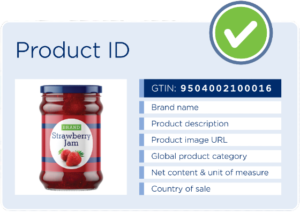For us as a wholesaler, consumer trust is everything and it has become increasingly relevant in recent years, a shift heightened even further by the global COVID-19 pandemic, with trends in society and digital media leading to an increased demand for transparency. To bridge those challenges, we have been working intensively on a series of global projects for the past two years with GS1 and other members of The Consumer Goods Forum behind the Product Data Coalition.
Presently, it is near impossible to accurately estimate the number of products traded across global markets, and even more so to understand how many of them have unique identifiers and find each product’s history and associated details. Data inconsistencies lead to costly workarounds and manual alternations. For businesses, this can be harmful to operations and complicate supply chains. And for consumers, this lack of clarity can lead to a reduced or total lack of trust.
The Global Trade Item Number (GTIN) Ubiquity project seeks to ensure that all physical products have a unique identifier. A Global Registry (Verified by GS1) project ensures that every product in the world has a unique GTIN that can be authenticated and validated by trading partners. And, the Global Data Model (GDM) project defines a globally consistent set of mandatory product attributes required by all retailers to list, order, move, store and sell products all over the world.

We have learned that solving the GTIN match not only improves master data management – once you have the right identifier, exchanging the rest of the data set is fast and smooth – it can also help us solve many deficiencies of the business relationship on both sides.
The unique identifier and validated product eases commercial exchanges and listing, presenting accurate range and category allocation, and improves merchandising. In supply chain logistics, it allows proper performance management between us and our suppliers and reduces inaccuracies. In operations, it leads to reduction of issues with stock and shelf availability and correct marketing of products to our consumers across digital platforms. It goes without saying that the identifier is the entry point to ensuring consumer transparency, satisfaction, and trust.
Today, some companies still choose to find technological solutions over simply ensuring the data is correct. Technology can do most things when powered by correct data. However, it cannot create the correct context, no matter how much money companies choose to throw at it. Simply put, digitalisation across companies and platforms won’t work unless the issue of identification and harmonisation is improved.
While product data management can be complex, the opportunities for automation, speed, and increased quality that the Coalition projects reveal are an important step in driving positive change for the industry at large. We are ready to implement the changes in our processes with Nestlé and Procter & Gamble, and plan to continue supplier by supplier, market by market.
At METRO, we’ve seen the benefits first-hand and we encourage more retailers to join us and see for themselves. We are connecting with our competitors and suppliers to validate the data with increased focus on Germany, France, and Turkey where we want to prove the tangible benefits in 2021.
This blog was written and contributed by:
Andrea Schlossarek
Director, Corporate Master Data Management
METRO AG

